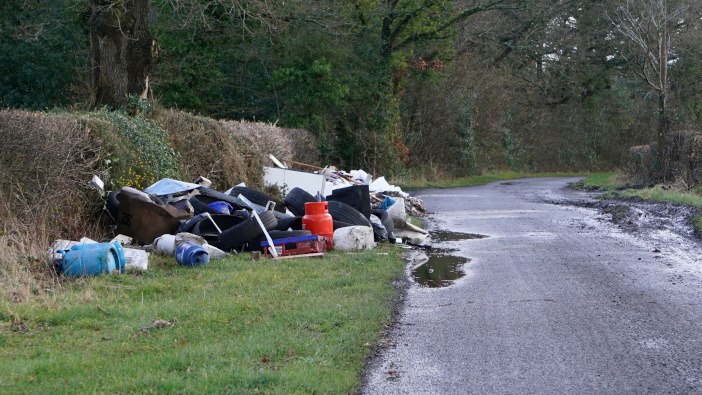The Country Land and Business Association (CLA) has called on the government to launch its rural crime strategy as new Defra figures show an increase in fly-tipping.
Latest statistics show that councils dealt with 1.15m incidents in 2023/24, although this figure only accounts for waste dumped on public land and reported to the authorities. It misses the many incidents that occur on privately owned land.
A snapshot survey conducted by the CLA showed that 90% of respondents had been victims of fly-tipping in the last 12 months, with tyres, cannabis farm vegetation, nitrous oxide canisters, cooking oil drums, mattresses, fridges and sofas dumped.
Almost 40% had experienced at least six separate incidents in that timeframe, while 75% said that fly-tipping had a significant financial impact on their business. More than 90% said that local authorities required increased resourcing to fight against fly-tipping.
CLA president Victoria Vyvyan said: “Rural communities have had enough of fly-tipping and waste crime, and the government must act. Farmers and the countryside are increasingly being targeted by organised crime gangs – often violent – who know that rural areas are under-policed and so they target them. The long-promised rural crime strategy needs to be published as soon as possible.
“It’s not just litter blotting the landscape, but tonnes of household and commercial waste which can often be hazardous – even including asbestos and chemicals – endangering farmers, wildlife, livestock, crops and the environment.
“As Labour itself has pointed out, the crime rate in rural areas has surged by 32 per cent since 2011, faster than in urban areas. People, communities and businesses deserve to feel safe and protected, and the first place to start must surely be ending the chronic under-funding of rural police forces.”
Members speak out
Colin Rayner, whose family farm in Berkshire, Buckinghamshire and Surrey, said: “The Rayner family farms have incidents of fly-tipping every day, from a bag of garden waste to lorry loads of waste.
“We have made our farms into medieval forts to try to reduce large loads of waste being tipped on the farms. The cost to the family in terms of extra security, clearing up the waste and threats from the fly-tipping gangs is too much to bear at times.”
John Giffard, of the Chillington Estate, Staffordshire, said: “Fly-tipping is a recurring issue across Chillington, creating a significant financial strain on both the estate and the council, as well as wasting valuable time and resources.
“Our frustration is heightened by the lack of action from public bodies, especially when we’ve identified the source of the problem.
“The good news is that the local police force has established new rural policing teams in the county’s most remote areas, and we’re encouraged to see that tackling fly-tipping is now a top priority for them.
“Thanks to the continued support of the Country Land and Business Association, Chillington is now collaborating with public bodies to initiate prosecutions against those responsible.”
David Bliss, CEO of Lowther Estates in Cumbria, said: “We usually experience five or six fly-tipping incidents per year, which, aside from being an annoyance, is costly to clear up.
“Ministers should look urgently at increasing the penalties for convicted fly-tippers and properly resource rural police forces to ensure they are held to account. Without more progress, landowners, not the criminals, will continue to pay the price.”


